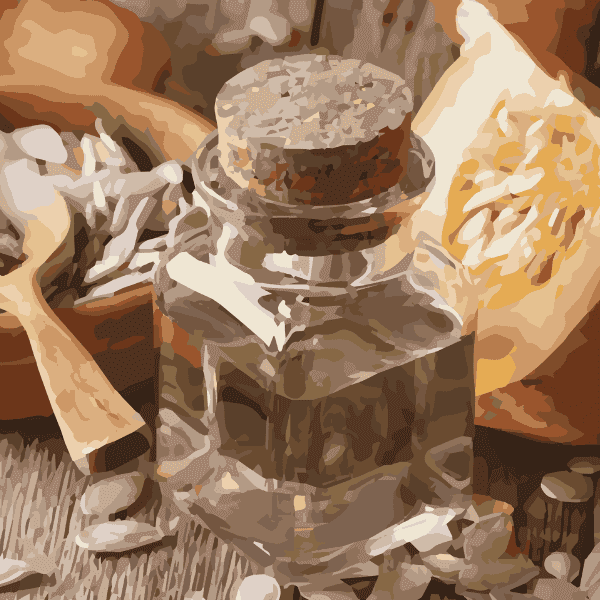
Pumpkin Seed Oil {Organic}
Pumpkin seed oil comes from the fall favorite, pumpkin, a plant native to Mexico. There are several benefits, such as being a possible anti-parasitic, may improve heart health, hormonal health, and urinary tract health. This oil is made by pressing the seeds. It is commonly used in food and even in supplements.
The popular fall fruit and seed snack also has several health benefits. The pulp of the pumpkin can be roasted and eaten in a variety of foods including pumpkin pie and pumpkin bread. The seeds can be eaten raw or roasted, and the oil from the seeds also has a lot of health benefits.
What is Pumpkin Seed Oil?
Pumpkin seed oil is a vegetable oil that is extracted from the seeds of pumpkin. It is known for its uses in culinary, cosmetic, and for its health benefits. It has a nutty taste.
Benefits of Pumpkin Seed Oil
- May be antiparasitic: The plant pumpkin and its seed have historical and empirical data that supports its use as an antiparasitic. There are now a few studies emerging that also indicate that pumpkin seed oil may also be antiparasitic.
- May support heart health: It is a great source of health fats, including omega 6s like linoleic acid and phytosterols. People that have supplemented with pumpkin seed oil have seen a decrease in LDL as well as a decrease in blood pressure, both of which are contributed to the fatty acids and phytosterols of pumpkin seed oil.
- Antioxidant: Pumpkin seed oil is also rich in polyphenols and carotenoids, both great antioxidants. These antioxidants can help protect the body from inflammation and free radical damage.
- May Support Hormone Health: Pumpkin seed oil also contains phytoestrogens, which are plant contents that mimic estrogen. Women have seen a reduction in menopausal symptoms like hot flashes, headaches, and joint pain when supplementing with pumpkin seed oil.
- May Support urinary tract health: There have been several studies demonstrating the benefits of pumpkin seed oil in men with enlarge prostates, as well as in people with overactive bladders.
Common Ways to Use Pumpkin Seed Oil
Culinary Uses: Pumpkin seed oil is used in several culinary ways: dressings, marinades, and dips.
Supplementation: Due to its health benefits, it can also be taken in a capsule or liquid daily or when needed.
How it is Made
Pumpkin seed oil is made from pressing the seeds of the pumpkins until oil seeps out. Common industry practice is to roast the pumpkin seeds prior to pressing them, but if you want to capitalize on all the benefits pumpkin seed oil has to offer, oil from raw pumpkin seeds is best.
Cold Pressed: This is the best way to get pumpkin seed oil. A machine presses the seeds in a cold room or at room temperature, and the oil leaks out and is collected. This process is best for preserving all the nutrients the oil has.
Hot Pressed: This is very similar to cold pressed, only the seeds are heated up first. The heat makes it so that you can get more oil, but the oil has less nutrients and can go bad faster.
Chemical extraction: This process involves chemistry. Chemicals (known as solvents) are used to get the oils out. These chemicals are not good for our hair or skin, and nutrients are lost in the process as well.
Safety Concerns
Pumpkin seed oil is generally considered safe when consumed in moderate amounts. The high fat content may result in nausea and diarrhea if over consumed.
Drug Interaction: If you are on medications and are concerned with how they may interact with pumpkin seed oil, please consult a medical professional.
Breastfeeding and Pregnancy: Pumpkin seed oil is safe for breastfeeding and pregnancy.
Other Concerns: If you are allergic to pumpkin, you should not use pumpkin seed oil.
Select Studies of Pumpkin Seed Oil
Researchers studied the effects of pumpkin seed oil (PSO) on blood pressure and heart health in postmenopausal women with high blood pressure. Participants were given either PSO or a placebo for six weeks. The study found that those who took PSO had significant decreases in systolic blood pressure and measures of arterial health, while heart rate variability and arterial stiffness did not change in either group. The results suggest that PSO may help improve blood pressure and arterial function in postmenopausal women, making it a potential treatment for hypertension in this group.
Researchers studied the effects of pumpkin seed oil (PSO) on a tropical parasitic disease, schistosomiasis, which is typically treated with praziquantel (PZQ). They found that PSO was more effective in killing the parasite at various life stages, especially juveniles and newly formed parasites than PZQ. By exposing the parasites to different concentrations of PSO over various time periods, they observed significant changes in the parasites' outer layers and DNA. The study concluded that PSO has promising potential as a treatment for schistosomiasis, and further research is needed to understand how it works.